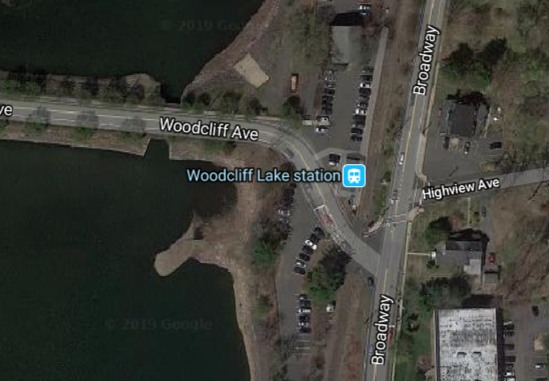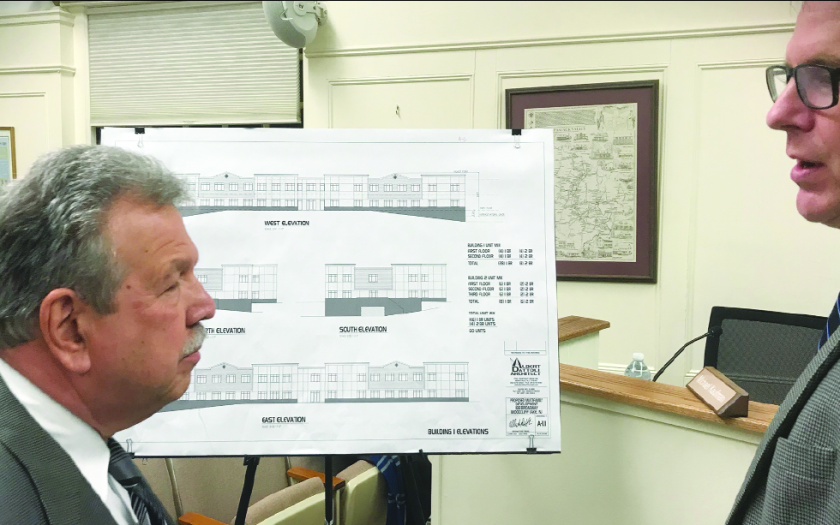
BY MICHAEL OLOHAN
OF PASCACK PRESS
WOODCLIFF LAKE, N.J.—A second hearing Jan. 23 on a proposed two-building, 60-unit multi-family housing development at 188 Broadway led to more questions about affordable housing requirements, and possible community impacts—both positive and negative.
Testimony from two expert witnesses—an architect and real estate broker—was questioned by Zoning Board members and the public at a contentious second hearing for a proposal that critics characterize as a “high-density development” which is likely to cause public safety risks. These include emergency vehicle access and traffic.
The applicant, 188 Broadway LP, is seeking three variances, including a use variance to put a residential housing in an S-O zone, or Special Office district. The property along Broadway is located partially in an S-O zone and partially in the R-15 residential district for single-family homes.
In addition, the applicant seeks two additional variances: one to construct a three-story building (Building 2) on site, where zoning only allows a 2.5 story building; and one for only 185 square foot of landscaping for an interior parking lot where zoning code requires a minimum of 1.320 square feet.
Building 1 is entirely in the S-O zone and Building 2 (to be constructed) will also be built in the S-O zone, said applicant attorney Stuart Liebman. Currently a two-story office building exists in the front of the site, and the rear of property is a parking lot, where a second building will be constructed, he said. He said the R-15 zone will not be developed.
The applicant proposed converting one existing building, called Building One, into 28 one-bedroom and eight two-bedroom units; and construct a second building (Building 2) on site to include 18 one-bedroom and six two-bedroom units.

Three-plus hour hearing
During the three-plus hour hearing, the applicant’s attorney, James Delia, allowed architect Albert Dattoli to answer board and public questions and presented Charles Oppler, CEO and managing partner, Prominent Properties/Sotheby’s International Realty, Franklin Lakes, in hopes of proving to board members and residents that property values would not decrease with the proposed development.
During and after the meeting, however, residents of a citizen’s group, SHINE, wore taped on stickers highlighting the acronym “SOD” for Stop Overdevelopment.
They said that the 60-unit proposal was unneeded, too dense for the site, and would lead to increased traffic and problems with emergency vehicle access, and could delay with emergency vehicles, thus risking lives.
However, Zoning Board members urged residents to question only testimony provided by each expert witness—and asked residents who filled Borough Hall not to venture opinions or comments on unrelated topics.
Generally, personal opinions and statements are only allowed at the conclusion of applicant hearings.
Fire safety assured
Delia opened the hearing noting that the developer had met with local fire department officials and resolved nine site safety and access issues the department raised in a letter sent in mid-December.
The applicant requested the Dec. 18 hearing date be rescheduled to allow them time to address each issue raised such as: hydraulic (not electric) elevators in buildings; roof access in case of fire, fire department water stand pipes in every stairwell, a new fire hydrant, Knox Boxes, and free movement for emergency vehicles on site.
In mid-January, Delia said the applicant and fire department met and resolved outstanding site safety and access issues. “We have ample and safe fire circulation pattern on site,” said Dattoli.
At one point when Dattoli said the rooftop HVAC units range 27–38 inches high and are centrally located on roofs below the parapets, thus not visible from nearby homes or Broadway, several attendees groaned.
Affordable units queried
Dattoli said he believed 15 percent of rental units in both buildings would be for affordable housing and said “we will comply with Mount Laurel affordable housing requirements” adding future testimony will address affordable housing in detail. Fifteen percent would equal nine affordable units of 60 units in both buildings.
Board Planner Richard Preiss told Dattoli that under Woodcliff Lake’s affordable housing settlement and Mount Laurel regulations, the nine affordable units should probably comprise one one-bedroom unit; six two-bedroom units; and two three-bedroom units.
The applicant planner is scheduled to testify at the next hearing.
Preiss said the Zoning Board can apply the set-aside requirement for affordable housing in a multifamily development, defined as five or more units, (20-percent for market-rate units; 15-percent for rental units) as a condition of approval even if the development was submitted before adoption of a Housing and Fair Share Element ordinance.
Member Gary Newman said that because the applicant seeks a use variance, which requires “a very high standard,” “so how many affordable units the developer wants to put in matters.”
All agreed the affordable housing questions should be addressed to the applicant planner at the next hearing.
Other questions concerned building heights, ground elevations, buildings’ visibility from nearby roads/homes, and site appropriateness to handle two buildings where only one currently exists.
‘No impact’ on home values?
Following over one hour of testimony from Charles Oppler, a real estate broker and executive with Prominent Properties, who testified he did not see any impact on home property values from construction of a nearby multifamily development, the board attorney cautioned members to be aware that Oppler was not a licensed appraiser and not an expert on value.
Oppler was questioned frequently by member Gary Newman, who attempted to request “hard data” backing up Oppler’s general statements and to limit testimony to specific areas of Oppler’s expertise.
Following Oppler providing opinions on a variety of real-estate trends and topics, Board Attorney Sal Princiotto said expert opinion is based upon an experts’ training, background, education and license.
He repeated that board members must determine “what weight, if any” to provide to Oppler’s testimony.
He said Oppler “didn’t really look at the plans” or cite specific real estate studies to back up opinions and so board members “should decide to accept (testimony) or reject it based on the witness’s qualifications and the extent to any factual support for his opinion.”
The next hearing is Feb. 26 at 7:30 p.m. at Borough Hall. Testimony is anticipated from the applicant’s consulting engineer, plus traffic expert and fire safety consultants.
